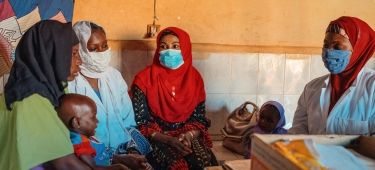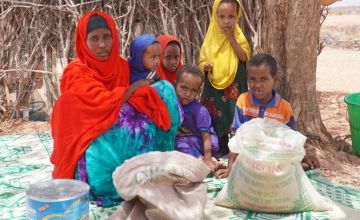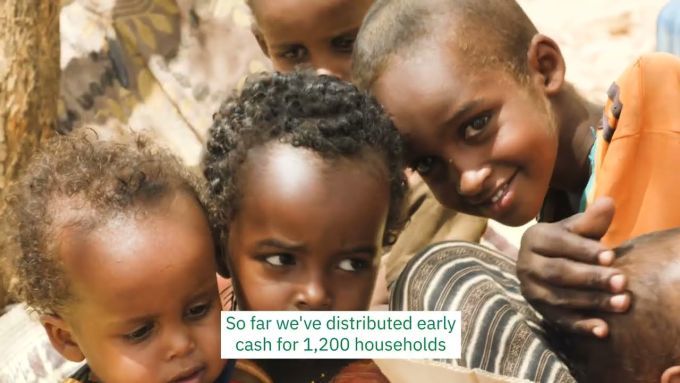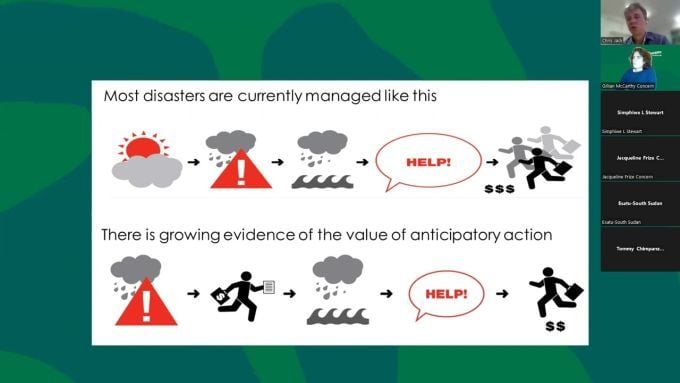
Read our 2024 annual report

Knowledge Hub

Enhanced Responses to Nutrition Emergencies (ERNE)
What is ERNE?
Enhanced Responses to Nutrition Emergencies (ERNE) is a 3-year programme implemented by Concern under a Pilot Programmatic Partnership (PPP) with the EU’s Civil Protection and Humanitarian Aid Operations department (ECHO). The programme is being implemented in five countries in Sub-Saharan African: DRC, Ethiopia, Niger, Republic of Sudan and South Sudan.
Through ERNE, Concern aims to increase the scale, efficiency and effectiveness of its nutrition emergency responses by working with local services and communities to implement proven and innovative solutions in fragile, conflict affected and disaster-prone countries. The programme combines lifesaving emergency nutrition treatment and prevention and preparedness activities to build community resilience to malnutrition in the longer term, to support over 1,000,000 people.
What is the PPP?
Concern is implementing ERNE in partnership with the EU under the Pilot Programmatic Partnership (PPP). This innovative partnership provides multi-annual, flexible funding in line with Grand Bargain commitments in order to increase the efficiency and effectiveness of humanitarian aid.
The PPP is facilitating longer-term programming which links the treatment of acute malnutrition with health systems strengthening and an early warning system ensuring communities can act to prevent or mitigate the effects of crises which impact on malnutrition. Increased flexibility through the PPP enables Concern to respond more effectively to emergencies, including providing cash-transfers to vulnerable people, and responding to the COVID-19 pandemic.
ERNE 3 Pillars
ERNE has five Result Areas: 1) Community-based Management of Acute Malnutrition (CMAM), 2) Early Action and Response to rapid onset crises, 3) CMAM Surge and Early Warning Early Action, 4) Nutrition Resilience, 5) Advocacy and Learning.
ERNE is arranged in three overall pillars:
- 1
Pillar 1
(Results 1 and 2)
Focuses on life saving interventions by ensuring the provision and increased quality of primary health and nutrition services using the CMAM approach and cash transfers/ vouchers/ in-kind.
- 2
Pillar 2
(Result 4)
Focuses on preparedness and local capacity to respond. The aim is to reduce the impact of nutrition and food security shocks by enabling people and systems to anticipate and prepare.
- 3
Pillar 3
(Result 3)
Focuses on understanding and addressing the underlying elements that make people vulnerable to undernutrition.
CMAM Surge Approach
One of the key approaches implemented under Pillar 2 of the ERNE programme is the CMAM Surge approach. CMAM Surge compliments routine CMAM services strengthening local capacity to anticipate, prepare for and respond to increased demands in acute malnutrition treatment services at peak times. The ERNE programme is supporting the scale up of CMAM Surge in Niger and Ethiopia, and the initiation of CMAM Surge in Sudan and South Sudan. In addition, the ERNE programme is supporting coordination via the Global CMAM Surge Taskforce and innovations such the Health Surge approach.
Early Warning Early Action Approach
Concern is implementing a shock responsive safety net type approach, undertaking Early Action responses triggered by context-specific early warning systems. The ERNE programme partners with the Red Cross Climate Centre (RCCC) to draw on additional technical support and specific RCCC expertise to assist with the key areas of Early Warning Early Action (EWEA).

ERNE Learning
Concern is committed to capturing the learning opportunities that such an ambitious, multi-country, multi-annual programme such as ERNE offers. We will continue to update this section with our learning publications, which cover all aspects of the programme as well as our experience of working under the ECHO PPP model.
Currently, we have learning on CMAM Surge, Health Surge, our work on Health Facility Assessments, and on Early Warning Early Action and Rapid Responses, and Integration of Nutrition, Health and WASH in South Sudan:
Learn about Concern’s Health Facilities Assessment tool, piloted in the Democratic Republic of Congo (DRC), Ethiopia, Niger, South Sudan and Sudan to set a baseline for health facility capacity under Concern’s ECHO-funded Enhanced Response to Nutrition Emergencies (ERNE) programme:
As part of the Nutrition for Growth 2021 Summit, Concern hosted a webinar on Building Resilient Health Systems in Fragile Contexts to Prevent and Treat Malnutrition, which includes learning from the ERNE programme. Read the Webinar Summary Report:
In April 2023, the ERNE Early Warning Early Action team joined the Red Cross Climate Centre (RCCC) for a learning webinar to share and discuss lessons learned by Concern in Ethiopia, Niger, South Sudan and Sudan on implementing Early Warning Early Action/ Anticipatory Action in fragile contexts. View the webinar here:
This page covers humanitarian aid activities implemented with the financial assistance of the European Union, the European Civil Protection and Humanitarian Aid Operations Department (ECHO). The views expressed herein should not be taken, in any way, to reflect the official opinion of the European Union, and the European Commission is not responsible for any use that may be made of the information it contains.



